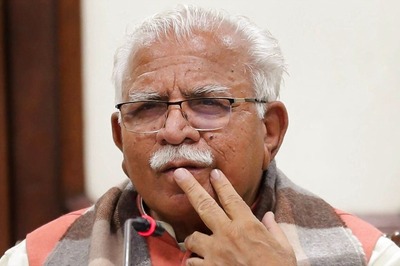
views
Indian companies are set for an average salary increase of 9.6 per cent in 2024, similar to the actual increase in 2023, according to an EY report released on Wednesday. It also said hybrid work culture is gaining importance as it helps enhance work-life balance, productivity, and satisfaction.
The report said that overall attrition during 2023 dropped to 18.3 per cent, compared with 21.2 per cent in 2022.
“E-commerce is expected to have the highest salary growth in 2024 at 10.9 per cent, followed by financial services with a projected growth of 10.1 per cent. Professional services’ salary is set to grow by 10 per cent in 2024, suggesting a rebound as companies invest in strategy alignment to navigate global business complexities,” according to the second edition of EY ‘Future of Pay 2024’ report.
The impact of real estate and infrastructure as an emerging sector is also visible, as increments continue to be stable at 10 per cent, it said.
Abhishek Sen, Partner and Leader, Total Rewards, HR Technology and Learning, People Advisory Services, EY India, said, “While overall average salary increase in India Inc holds steady compared to last year, certain sectors such as e-commerce, financial services and professional services firms are poised for significant pay raise in 2024.”
He added that there is also a discernible trend towards embracing a more comprehensive Rewards Value Proposition (RVP) to drive better ROI across all industries. Going forward, organizations will harness the transformative power of AI to craft bespoke benefits packages, optimize reward procedures, and elevate overall employee satisfaction at workplace.
Top Talent Trends In 2024
“Hybrid work cultures is gaining importance as it helps enhance work-life balance, productivity, and satisfaction,” it said.
Unique hiring trends are observed in various sectors, like formation of ESG teams in financial services sector. There is an increasing trend towards ESG reporting among Indian companies with 60 per cent firms already utilizing or on their way to utilise ESG policies, the report said.
Attrition Across Sectors
“Overall attrition is set to gradually decline over the next few years as companies prioritise cost management and employee wellbeing, stabilising the workforce amidst high talent demand,” said the report.
The highest levels of attrition in 2023 prevailed in financial services (24.8 per cent), professional services (24.2 per cent) and information technology (23.3 per cent).
This year, voluntary attrition decreased slightly, while involuntary attrition rose, particularly among global companies, indicating layoffs in the IT and startup sectors due to global economic changes.
Trends in Total Rewards
A total of 80 per cent of the organisations emphasised the importance of ‘pay and benefits’ and a need to move away from traditional employee benefits in the modern workforce. Top-three areas of focus for employers are benefits cost planning (43 per cent), employee wellness (29 per cent), evaluating and aligning with industry standards (20 per cent).
At 43 per cent, variable pay plan (non-sales) are the most common type of incentives plans offered in the organisation, followed by discretionary incentives (32 per cent) and sales incentive plan (21 per cent).
LTIPs Becoming More Diverse, Flexible
According to the report, organisations have been creatively revamping their long-term incentive plans (LTIPs) in recent years. Shifting from cash rewards to stock incentives, around 26 per cent of companies focussed on LTIPs for performance rewards in FY23. There is also a marked increase in penetration of this rewards component across non-CXO cadres fuelled largely by the booming new age digital enterprise growth in India.















Comments
0 comment